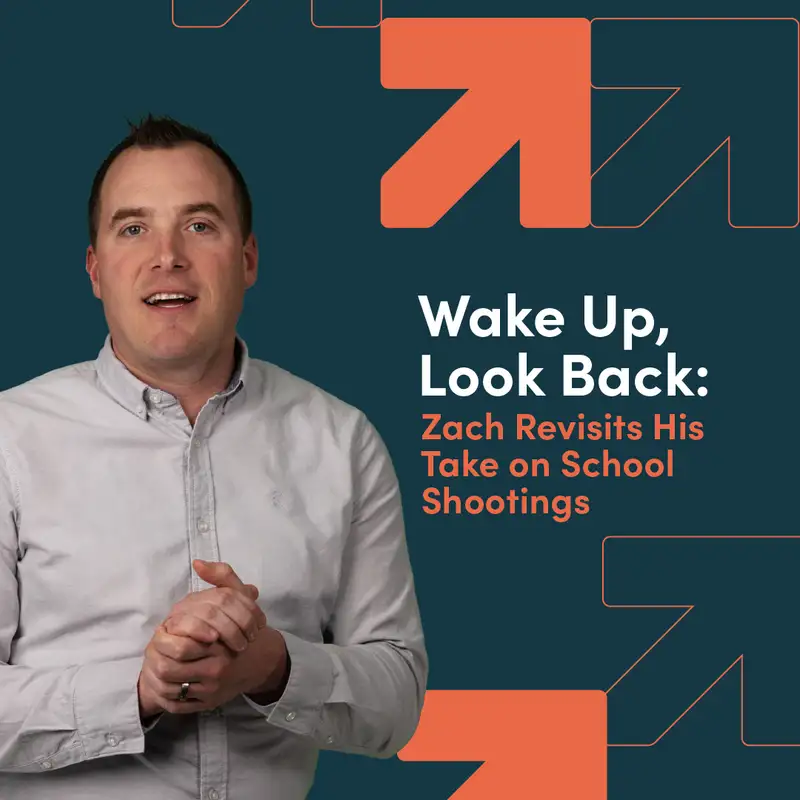Wake Up, Look Back: Zach Revisits His Take on School Shootings
Hello, everyone. Thanks for listening to Wake Up, Look Up, a podcast where we connect events happening in real time to the gospel of Jesus Christ. I'm Zach Weihrauch. In today's episode, we're throwing it back. This is something fun we're doing this summer occasionally where we take the opportunity to look back at a previous episode that had a lot of high traffic, a lot of comments on the Internet, and reexamine the the opinions that I advanced related to that news story.
And this particular episode is looking back on one we did on a school shooting. We were asking the question, who can I blame? Now I'm sad to say that in one year of doing wake up, look up, we have returned to the issue of gun violence and even mass shootings, time and time again, and those are just the stories we talked about. Of course, there were other stories around the country and in the news that we just didn't get to. Gun violence and particularly school shootings just seem to keep popping up across the landscape of our country, which, of course, begs the question, how should we think about these things and and shows each one of us that our first move tends to want to be to blame someone, to blame the police, to blame families, to blame teachers, to blame kids, to blame media, to blame guns.
But one of the things we said in the previous episode that I think is worth visiting is that Christians have a few more toolbox tools in our toolbox than just blame. In fact, blame really doesn't get anywhere. So I wanna remind you, because I think it's worth coming back to time and time again, three other tools that I think Christians should reach for in times of violence and in times of school shootings. The first is a biblical idea of lament. Lament is crying out to God because the world is broken.
Lament is crying out to God because he is the only one who can put it back together. Blame presupposes that we are capable of doing something a little differently that would fix the problem we're up against. It's like thinking, there's a dial that someone should have turned, that if they had just turned the dial up or down, this wouldn't have happened. And certainly, human behavior and human choices, are part of why our world is broken, but we are not capable of turning the own our dials in our own hearts. I mean, is is that the way you are able to deal with your sin?
It's certainly not the way I'm able to deal with mine. Just by tweaking some things, all of a sudden, I'm fixed. Lament is a reminder that fundamentally, what is wrong with us and is wrong with the world is something that only God can deal with. And Lament is going to him and saying, God, we need this, and a little bit, why haven't you already done this? One of the things that I've learned in my now 41 of life is that the feelings you don't talk about are the ones that tend to devastate you.
Lament is going to god and saying, god, I'm pretty upset about this, and I don't even know if everything I'm gonna say is theologically accurate or fair, but I need to say it. And lament is steeped in the idea that God's love for us is great enough that he's okay with us saying it. So Christians need to get a little better about lamenting. The second tool, though, is love for our neighbor. That sounds cliche.
You know, love conquers, love can overcome, but it's true. Time and time again in these school shooting situations, what you see is that the school shooter is typically a young person who is pretty isolated in their lives, not a lot of actual social interaction, ostracized by their peers, and overlooked by adults. And in every one of those stories, I can't help but feel like they were probably Christians in proximity to that person who simply weren't paying attention. And I'm not judging them for that. Again, I've gotta get better at this.
You've gotta get better at this. But we have to realize that the pull of the gospel, the call on Christians, is to reach out to those on the margins and pull them in. Our eyes should always be scanning for those that are hurting and those that are alone. First, because they matter, but also because loneliness devastates people and can lead them to some pretty devastating results. Behind every school shooting is a pretty simple question.
What if the Christians in that community had done a better job of loving their neighbors? Which, of course, begs a beg bigger question for you and I, why aren't I doing a better job? And then, of course, that leads to a third tool, which is we need to be consistent about telling people about Jesus. My eight year old son just invited two of his baseball teammates to church the other day, and their immediate response to that was what is church? We underestimate how disconnected those around us are from not only the Christian message from but from the place that they go to hear it.
The gospel really does provide hope. It really can help people deal with the crippling anxiety and guilt they are feeling. It really can change people, which means it can take a troubled kid or someone dealing with mental health and actually put them on the road to recovery and to reconciliation. It can turn school shooters into people with promising futures. Do we believe that?
Maybe the true measure of whether or not we believe that is whether we're looking to share it with those around us. School shootings are awful, and I'm not pretending that any of these things will stop them forever, but I am saying this. I bet if Christians got serious about these three tools instead of blame, it would make a difference. Hey. Thanks for watching this episode of Wake Up, Look Up.
If you enjoyed it, please help us get the word out by sharing it with someone you think might benefit from it. And while you're here, make sure to subscribe to our YouTube channel to get further content or even download the CCC app where you'll find even more resources to help you grow in your faith and relationship with Jesus Christ.
Have an article you’d like Zach to discuss? Email us at wakeup@ccchapel.com!
Creators and Guests


